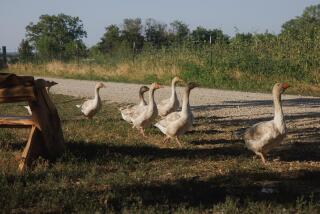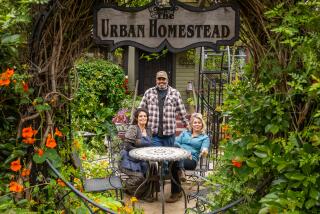Soviet Farmer Reaps Faith in Land : Food: Ideology stands in the way of efficient farming and preserves state-run collectives, an independent grower declares.
BARACHEVO, Soviet Union â Food is scarce in Soviet cities, but farmer Alexei Borisov has five tons of beets, cabbages and potatoes under the log cabin he built himself.
On a recent frosty morning, he filled a large wicker basket with cabbages from his cellar, put on his best fur hat and went off to market with supreme confidence.
âIâm ready to compete,â Borisov said with a lopsided grin that exposed two shiny steel teeth and gaps left by two missing molars.
The 48-year-old independent peasant farmer goes to market each week in the nearby city of Vologda knowing that his plump cabbages will command at least three times the price of worm-eaten specimens from state farms.
Borisov is allowed to farm a small plot of land independently because he also holds a regular job, as a watchman, in the official Soviet economy.
His vegetable cellar is the flip side of shortages that have attracted international attention and humanitarian aid this winter.
Mottled apples and dusty jars of sauerkraut often are all residents of major cities can find in government-owned stores supplied by inefficient collective farms and corruption-ridden state warehouses.
There is plenty to eat in Barachevo, a village of 16 families without running water or telephones in a frigid region 325 miles north of Moscow.
Even in the cities, farmersâ markets where private growers like Borisov sell their produce have row upon row of tables piled with ripe pears, melons, tomatoes, cucumbers, nuts, herbs, berries, meat, eggs and poultry.
The successes, frustrations and dreams of the Borisovs--Alexei, his wife, Olga, and their 20-year-old son, Andrei--go a long way toward explaining the Soviet food-supply problem.
Life is primitive for them in many ways. They bathe once a week at a public bathhouse and have no regular medical or dental care. They have no telephone to summon help in case of fire, crime or disaster.
They are not poor, however. They have a color television and a refrigerator. Hanging on the walls of their cabin, along with bunches of onions and garlic, are 38 icons, some more than 200 years old and very valuable.
Holding out a palmful of green fuzz, Borisov described how he built the two-room cabin, stuffing cracks between the logs with swamp moss, a natural insulator that does not rot.
He made most of the furniture, including two easy chairs and an armoire, and dug the cellar to hold the tons of produce. He also wired the cabin for electricity, which reached Barachevo in 1964.
Borisov cannot afford an automobile or tractor, but he paid a mechanic to rig a go-cart that will pull a small wagonload of vegetables.
Now, he is thinking luxury.
âRight here, Iâm going to put a new outhouse, with heat,â the farmer said one afternoon, pointing to a spot outside his front door. âNo more sitting in the cold.â
He has always wanted a balcony, even though the cabin does not have a second floor, so heâs building one outside the attic.
What Borisov wants most is more land, but that has proved elusive.
For five years, he has been trying to register as a full-time private farmer and rent or buy the field behind his cabin. He has kept copies of all the appeals to, and rejection letters from, local government and Communist Party officials.
The 11-acre field belongs to the Red Star State Farm, which uses it occasionally as a cow pasture. The farm has more than 2,500 acres, including ample pasture, but has refused to deal with the Borisovs.
âIf we begin giving our land up to private farmers, we wonât have any left,â Albina Isayeva, the farmâs chief economist, said in an interview.
Farmers on small private plots grew most of the Soviet Unionâs food for a decade after the Bolshevik Revolution of 1917. In the late 1920s and early 1930s, dictator Josef Stalin confiscated their property and forced them onto collective farms, executing those who resisted.
Some reformers want to break up the collectives, arguing that the nation cannot feed itself unless it scraps communist ideology and returns the land to family farmers motivated by profit and pride.
Lawmakers in Russia, largest of the 15 Soviet republics, have voted to restore private farming but President Mikhail S. Gorbachev, who was raised on a collective farm, favors a national referendum on the issue.
As a result, national law still forbids private ownership of land except for small âgarden plots.â By Western estimates, such plots account for less than 5% of the land under cultivation but produce more than 60% of the fresh vegetables sold in major cities.
Borisov has only one-eighth of an acre, but farms it so intensively that, in a good year, it yields tons of cabbage, potatoes, carrots, onions and garlic.
The family keeps enough for itself and takes the rest to a farmersâ market in Vologda, a city of about 300,000 people 12 miles away.
They charge 1 or 2 rubles a kilogram (75 cents to $1.50 a pound at the official exchange rate) for cabbage and make a profit of about 300 rubles ($500) a month, slightly more than the national average wage.
To meet the legal requirement of holding a job, Borisov is a watchman at an army food depot. He works a 24-hour shift, then gets three days off to tend his crops and animals.
If he could get a few acres to farm, Borisov said, he could easily grow 10 times as much and help make it unnecessary for his country to accept gifts of food from abroad, which he called a ânational disgrace.â
By many accounts, villages like Barachevo are dying as peasants flock from state farms to cities to escape the monotony of country life. Borisov says he is âtoo busy to get bored.â
He rises at 6 a.m., drinks a bitter wildflower tea to ward off colds and fever, then listens to the radio news as he boils white beets in an army surplus caldron to feed his sheep and pigs.
Olga Borisov washes dishes with buckets of water from the village well. Between shifts at his job as a railroad worker, Andrei shovels manure out of the ice-covered barn, then heads for the warmest seat in the cabin, next to the floor-to-ceiling stove of whitewashed brick.
Andrei said he would gladly join his father as a farmer if they could obtain more land, but the one-eighth-acre plot is not large enough for both of them.
More to Read
Sign up for Essential California
The most important California stories and recommendations in your inbox every morning.
You may occasionally receive promotional content from the Los Angeles Times.










